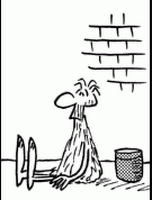I began to cast about for other bread recipes, and discovered that I liked heavier breads with more bran, and more whole grains in them. Unfortunately, my early attempts at these breads were inedible for my wife. I baked a lot of bricks. I needed to find a way to get the bread to become more airy.
Eagerly I awaited Hertzberg & Francois' second book, 'Healthy Bread in Five Minutes a Day'. This book had a lot of new recipes that used whole grains. But most recipes also used Vital Wheat Gluten, and even with this additive, I was unimpressed with many of the breads, both for their taste and their structure.
I was still searching. I discovered that many online bakers at the various web sites that I frequented were following Peter Reinhart's book 'The Bread Baker's Apprentice'. I did purchase that book, but I only made a couple of breads from it, surely not enough to master his techniques, and not even enough to develop a refinement of my taste. I can't say that I preferred his bread over the five minute a day breads. So, why make a bread that takes 2-3 days of effort when you can just stir it up and refrigerate the dough and make bread whenever you need to?
One thing I did, however, was follow Reinhart's roadmap to make a sourdough starter. I actually originally made 4 different starters! One was made with rye, one was made with all-purpose flour, one was made with whole-wheat flour, and I think the final one was made with a combination of rye and all-purpose flours. Eventually I tossed away all but the rye and the all-purpose mother starters. I still call these starters 'Barm' because that is what Reinhart called them in 'The Bread Baker's Apprentice'.
I too rarely used these starters, because the recipes called for a lot of preparation, which is difficult for me and my nursing schedule. I found myself returning frequently to the 'Five Minute a Day' breads, just to have something to take to work.
In fact, I mostly used these starters when I was discarding them! Loathe (and too cheap) to simply toss them into the compost when I was replenishing them, I was casting about for a way to use the throwaway part in bread, and found something on the '5 min/day' website. There, Hertzberg says that if you are using a 100% starter (i.e. an equal water:flour ratio as Reinhart's are), you can use 1 1/2 cups of that starter in the 5 min/day recipe(s) and simply cut out 3/4 cup of both the water and flour. You can also cut out some (maybe even all) of the yeast, but you may have to wait for varying lengths of time for the initial rise's doubling.
I first tried this with a discard, using their master artisan 5minday recipe:
2 1/4 c water
5 3/4 c flour
1 1/2 c barm discard
1 1/2 tbsp yeast
1 1/2 tbsp kosher salt
This made a decent tasting loaf, but it had a funny odor to it that wasn't all that appealing to me -- it could have been the high bacteria content of my expired barm, I don't know.
Tonight I'm doubling the amount of barm discard to 3 cups. That means the recipe is:
1 1/2 c water
5 c flour
3 c barm discard
1 1/2 tbsp yeast
1 1/2 tbsp kosher salt
To get this amount of discard, I actually had to dip into my active barm. Despite that, and despite the fact that I kept all the yeast, this dough took almost twice as long to rise as the first recipe; but then, the house is rather cold tonight, so maybe you can't compare. (Note: this bread was a disaster. Since it was more goo than gluten, it wouldn't rise, and the baking was uneven. I tried to make some baguettes and the goo was simply running all over the place in the 90 minutes after refrigeration and before baking as it warmed to room temperature. In panic mode, I put it in the oven too early when the stone and the pan were not yet hot enough. Although I slashed the loaves, they blew apart in the oven like popcorn, totally uncontrolled. I ended up throwing most of it into the compost, even though some of it was a sourdough bread, and it had a decent taste and scent. This is just one more in a long line of bread disasters that I have endured. Maybe I should have called my blog 'Bread Disasters'. But only an Exorphin Junkie would continue on trying to make bread in the face of so many awful bread fails and obvious lack of talent.)
Reinhart no longer calls his wild yeast starters 'Barms'. He corrects the nomenclature in his next book, 'Whole Grain Breads', where he simply calls it a mother starter. I have just recently purchased this book, and tonight I am starting the master recipe from that book for the first time, using my 100% rye starter. If the mother starter works, I will be baking the first loaf tomorrow, since it takes two days to make a single loaf of bread. Will it be worth it?
I have it in the back of my mind that I might like to bake my way through his entire 'Whole Grain Breads' book (others have done this with his other book, 'The Bread Baker's Apprentice'. But this all depends on whether this initial test goes well.
I'm really hoping that I can find something that both my wife and I will like.
Notes to Myself:
- Use your refreshed motherstarter. Don't wait until it is all worn out.
- Let the wild yeast fully rise your dough before baking
- Make sure the oven (and stone and water pan) are fully pre-heated, 30 minutes minimum.





No comments:
Post a Comment